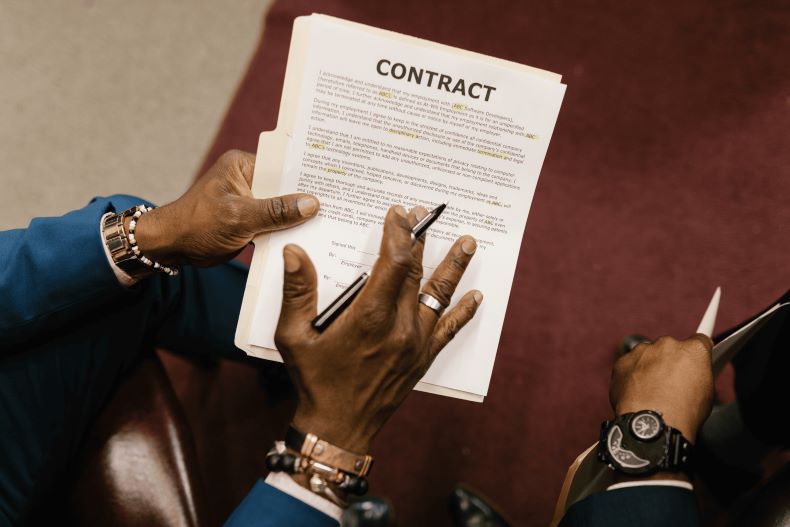Workers’ compensation is a crucial safety net for employees in California who suffer injuries or illnesses while on the job. This system provides financial support and access to necessary medical treatment to help injured workers recover and return to their livelihoods. However, a common question is, “Can you collect workers’ compensation after being fired from your job?” In California, as in many other states, the relationship between termination and workers’ comp benefits can be complex and contingent upon various factors.
This article sheds light on the intricate connection between employment termination and eligibility for workers’ compensation benefits in California. We’ll also discuss the legal remedies and strategies available for employees to access benefits.
Can You Collect Workers’ Comp After Being Fired from Your Job?
Got hurt at work? California’s workers’ comp laws have your back, offering a helping hand with medical costs and other benefits.
Even if you’ve been let go, there’s still a chance for California workers to claim workers’ comp benefits—if you can navigate through the necessary legal hoops and protections. But snagging those workers’ compensation benefits after being shown the door hinges on a few key things. These include why you were fired, how directly your injury or illness is tied to your job, and whether there are legal safeguards against retaliation in place. Thinking about fighting for your rights? It might be a good idea to bring a workers’ comp lawyer into the mix to help you sift through the nitty-gritty of California’s workers’ comp system and related employment laws.

Navigating the Perks of Workers’ Comp
California’s workers’ comp benefits offer a whole array of support to help out employees who’ve been injured or fallen ill on the job. Getting the lowdown on these benefits is key, especially when figuring out what you’re eligible for after a job loss.
Medical Care: Workers’ comp has got your back with covering the bills for any medical treatment tied to your work-related injury or sickness. We’re talking doctor visits, hospital stays, surgeries, meds, and even rehab services.
Temporary Disability Benefits: If your work injury or sickness has you benched for a bit, you might qualify for temporary disability benefits. These help pad your wallet with a chunk of your usual earnings while you’re on the mend.
Permanent Disability Benefits: If you wind up with a permanent disability from a work-related injury or illness, you could be looking at permanent disability benefits. These offer ongoing financial help to make up for any dip in your earning power.
Vocational Rehabilitation: Can’t get back to your old job because of your injury or illness? Workers’ comp might foot the bill for vocational rehab services. These can help you pick up new skills or find a job that’s a good fit.
Death Benefits: In the heartbreaking event that a work-related injury or illness results in death, workers’ comp steps in to provide death benefits to the surviving loved ones, like spouses and kiddos.
Mileage and Travel Expenses: Don’t forget—workers’ comp might also cover the costs of getting to and from medical appointments and treatments related to your injury or sickness.
Job Retention Rights: In certain cases, injured workers have the right to retention or reemployment rights, ensuring they can return to their previous position or a similar one after recovery.

Eligibility Criteria for Workers’ Compensation Benefits
In California, eligibility for workers’ compensation benefits is primarily based on two key criteria: sustaining a work-related injury or developing an occupational illness.
Work-Related Injury: To qualify for workers’ compensation benefits, your injury must be directly associated with your job duties or activities within the workplace. This implies that the injury must have occurred while you were executing tasks mandated by your employer or as a direct consequence of your employment.
Occupational Illness: Beyond work-related injuries, workers’ compensation also encompasses occupational illnesses. These refer to illnesses or medical conditions that gradually develop due to exposure to detrimental workplace conditions, such as interacting with toxic substances or engaging in repetitive motions that result in chronic conditions.
Other factors that also contribute to your eligibility for workers’ comp collection include:
Timely Reporting: Promptly report the injury or illness that you had during your working hours. Failing to report it to your employer within a specified time frame can jeopardize your eligibility for benefits.
No-Fault System: Workers’ compensation is a no-fault system, meaning you are generally eligible for benefits regardless of who or what caused the injury or illness. This system is designed to provide swift support to injured workers without requiring them to prove fault.
Employee Status: Generally, you must be an employee to qualify for workers’ compensation benefits. Independent contractors may not be eligible unless they meet specific criteria establishing an employer-employee relationship.
It’s advisable to have a workers’ compensation lawyer with you for filing workers’ compensation claims. An attorney can guide you through the complex legal process

Establishing a Causal Link Between Injuries and Termination
A pivotal element in determining eligibility for workers’ compensation following the termination of an injured worker involves establishing a compelling causal connection between the workplace injury or illness and the termination itself. This connection can significantly influence the outcome of your claim and your ability to collect workers’ compensation benefits.
Several key factors are considered when evaluating this causal connection:
Timing: The temporal relationship between your work-related injury or illness and your termination is vital. If your injury occurred shortly before or after being terminated, establishing a link may be more straightforward.
Documentation: Meticulous documentation of your work injury or illness is crucial. This involves seeking immediate medical attention, notifying your employer, and ensuring that all medical records explicitly establish the link between your condition and your job duties.
Witness Statements: Testimonies from colleagues or supervisors who can vouch for the circumstances surrounding your occupational injury or illness, and its impact on your employment, can be instrumental in establishing causation.
Expert Opinions: In certain instances, securing expert medical opinions to illustrate that your workplace conditions or duties directly led to your injury or illness may be necessary.

Reasons for Termination and Their Impact on Workers’ Compensation Eligibility
Termination from employment can arise for a variety of reasons, some of which may be legitimate, while others might be considered wrongful termination. Grasping these distinctions is vital when evaluating their impact on workers’ compensation claims.
Valid Termination
Valid termination transpires when an employer has a lawful reason for concluding the employment relationship. Typical valid reasons might encompass poor job performance, breach of workplace policies, economic layoffs, or business-oriented restructuring.
Wrongful Termination
Conversely, wrongful termination takes place when an employer ends an employee’s employment in breach of the law or employment contract. Frequent instances of wrongful termination involve discrimination, retaliation, and termination that contradicts public policy.

Impact of Termination on Workers’ Compensation Claims
The ramifications of termination on workers’ compensation claims predominantly hinge on the specific circumstances of the termination itself. Let’s delve into how various types of termination, such as termination for cause or termination without cause, can affect eligibility for benefits.
Termination for Cause
Termination for cause usually entails dismissing an employee due to misconduct, negligence, or breaching workplace rules. In such scenarios:
Workers’ compensation benefits may remain attainable if the injury or illness was authentically work-related, since the pivotal factor is the relationship between the injury and the job duties.
Misconduct or negligence by the employee does not inherently preclude them from receiving benefits, but it may be considered during the claims process.
Termination Without Cause
Termination without cause pertains to circumstances where employees are dismissed for reasons not related to their performance, such as layoffs or downsizing. In these cases:
Workers’ compensation benefits continue to be accessible if the injury or illness is genuinely work-related, irrespective of the termination reason.
Employees terminated without cause can typically pursue workers’ compensation claims based on the validity of their injury or illness.

Legal Actions to Pursue for Collecting Workers’ Comp Benefits
If you believe that you have been wrongfully terminated and that your termination has hindered your ability to collect workers’ compensation benefits, you may have legal recourse to protect your rights and seek remedies. Here are some potential legal actions you should consider:
Consulting with a Workers’ Compensation Attorney: The first step when facing termination and seeking workers’ compensation benefits is often to consult with an experienced workers’ compensation attorney. An attorney can assess the specific circumstances of the termination and the related workers’ comp claim to determine the best course of action.
Filing a Workers’ Compensation Claim: You should file a workers’ compensation claim right away if the termination occurred due to a workplace injury or illness. This is the initial step in seeking medical treatment and compensation for injuries, and it should be done regardless of the termination.
Appealing a Denied Claim: If the employer’s insurance company denies the workers’ compensation claim, you have the right to appeal the denial. A California employment attorney can assist with this process, gathering necessary evidence and presenting a strong case.
Pursuing a Retaliation Claim: You may have a retaliation claim if the termination is believed to be in retaliation for filing a workers’ compensation claim. Retaliation claims involve asserting that the termination was unlawful due to the employee seeking their legal right to workers’ compensation benefits.
Reviewing Employment Contracts: You should review any employment contracts or agreements they have with their employer. If the termination violates the terms of these agreements or implies a breach of contract, you can consider pursuing a breach of contract claim.
Documenting Evidence: Throughout the process, maintain detailed records of your job-related injuries, medical treatment receipts, the workers’ compensation claim process, and the circumstances surrounding your termination. This documentation can be invaluable in supporting legal claims.
Filing Complaints with Relevant Agencies: Depending on the nature of the alleged wrongful termination, you may need to file complaints with appropriate government agencies, such as the Equal Employment Opportunity Commission (EEOC) or the California Department of Fair Employment and Housing (DFEH). Your workers’ compensation attorney can best advise you on how to file a claim.

BLG Has a Team of Top California Employment Attorneys for Your Help
Navigating a termination that affects one’s ability to collect workers’ compensation benefits can be legally complex. Employees should seek legal counsel early to understand their rights and determine the most appropriate legal actions to pursue based on their specific circumstances. An attorney can provide tailored advice and representation to protect the employee’s rights and interests in this challenging situation.
Need help in filing a workers’ compensation claim? Let BLG’s top-rated California employment lawyers seek justice for you. Our team guides you throughout the legal process so that you can get the compensation you deserve.
Want to discuss your case with us? Book a free consultation call today!





